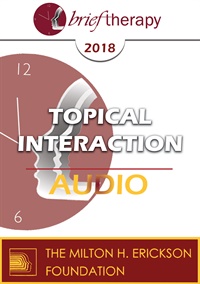BT18 Topical Interaction 15 - Working with Beliefs in Brief Therapy - Robert Dilts
- Average Rating:
- Not yet rated
- Topic Areas:
- Topical Interactions | Belief Systems | Brief Therapy | Therapist Development
- Categories:
- Brief Therapy Conference | Brief Therapy Conference 2018
- Faculty:
- Robert Dilts, BA
- Duration:
- 1:00:27
- Format:
- Audio Only
- Original Program Date:
- Dec 08, 2018
- License:
- Never Expires.
Description
Description:
Our beliefs are a very powerful force upon our behavior. It is common knowledge that if someone really believes he can do something he will do it, and if he believes something is impossible no amount of effort will convince him that it can be accomplished. Times of change and crisis bring out the significance of our beliefs even more strongly. The beliefs and stories (mental models and assumptions) that we and others hold during an unstable or crucial time determine the degree of resourcefulness with which we will face the situation. Empowering beliefs help us to identify and take best advantage of potential opportunities, while limiting beliefs focus us on danger and can trap us into old survival strategies (i.e., attack, retreat, freeze, etc.). This interaction will explore how to identify and work with the belief issues that arise during brief therapy.
Educational Objectives:
- Describe the fundamental structure of beliefs and belief systems.
- Present the five main areas of belief issues that occur in brief therapy.
- Explain how beliefs may be identified and addressed during a brief therapy session.
*Sessions may be edited for content and to preserve confidentiality*
Credits
Faculty

Robert Dilts, BA Related Seminars and Products
Robert Dilts, has been a developer, author, trainer and consultant in the field of Neuro-Linguistic Programming (NLP) - a model of human behavior, learning and communication - since its creation in 1975 by John Grinder and Richard Bandler. A long time student and colleague of both Grinder and Bandler, Robert also studied personally with Milton H. Erickson, M.D., and Gregory Bateson.


